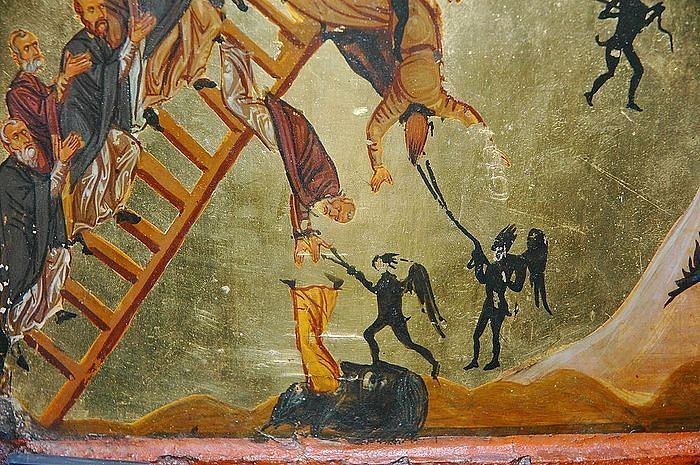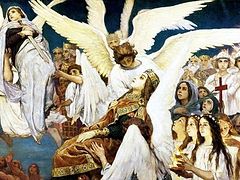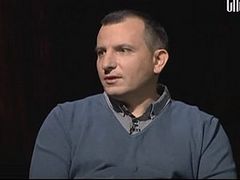There he goes again. David Bentley Hart, the "Orthodox Theologian" who thinks he knows better than the Fifth, Sixth and Seventh Ecumenical Councils about what Orthodoxy is, has now decided to weigh in on the question of the toll houses. I don't really have any great desire to rehash this question yet again, and would have just ignored this article, had DBH not decided to call me out personally in it:
"Among a great many Orthodox scholars in the academic world (especially when they gather together in hushed colloquy among the shadows and feel at liberty to speak strictly entre eux) it is often taken as depressing evidence of how radically the public intellectual culture of Orthodoxy in America has degenerated in recent years—how, that is, it has declined from the urbane, scholarly, perhaps slightly Mandarin sophistication of the generation of Alexander Schmemann and John Meyendorff to the fundamentalist, doctrinaire, and yet deeply uneducated primitivism promoted principally by former Evangelicals in the John Whiteford mold—than the increasing respectability of the myth of the aerial toll houses."
He further attempts to dismiss this tradition as having been "at most a fragment of quaint folklore, found in this country only among marginal eccentrics, like Seraphim Rose." Though later, he later concludes his essay with:
"Admittedly, some genuinely holy and venerable teachers of the Orthodox past have promoted the myth. But that is of no consequence. As Paul also says, “even if an angel out of heaven should proclaim to you good tidings that differ from what you received, let him be accursed”" (Galatians 1:8)" [emphasis added].
So apparently, the teaching was not limited to just a few "eccentrics" and uneducated fundamentalists, after all. But once again we run into some of the same problems with DBH's reasoning that we have run into before. Had he been properly catechized before he was received into the Orthodox Church, DBH would have learned to affirm "that the Holy Scriptures must be accepted and interpreted in accordance with the belief which hath been handed down by the Holy Fathers, and which the Holy Orthodox Church, our Mother, hath always held and still doth hold" (from the affirmations found in "The Office for the Reception of Converts," in the Service book of the Holy Orthodox-Catholic Apostolic Church, tr. Isabel Florence Hapgood, fourth Edition, Syrian Antiochian Orthodox Archdiocese of New York, New York, 1965, p. 458).
DBH does not demonstrate why he knows better than those "genuinely holy and venerable teachers" of the Church. He does not engage anything that they actually say on the subject. He does not even mention the countless references to the toll houses that are found in the services of the Church. He in fact does not engage a single statement or argument made by anyone on the subject. He merely dismisses them all as being advocated only by "uneducated fundamentalists," and then shares his opinions on the matter, which he apparently considers to be self-evidently true, since not a shred of evidence is actually offered.
It also doesn't seem to have occurred to DBH that by citing Galatians 1:8, as he does, he is suggesting that these "genuinely holy and venerable teachers of the Orthodox past" are anathema, having preached a false Gospel.
I readily admit that DBH's academic education is far better than my own -- my family's "white privilege" debit card having been mostly exhausted a few generations before my time -- and so as much as I would have liked to have gone on and gotten a PhD., I was doing good to pay the debt accrued for my BA in Theology, which was entirely my own responsibility. However, I did learn how to read fairly well, and I can follow a reasoned and supported argument, and can spot an argument based on little more than ad hominem and gratuitous assertions. And even if someone is uneducated, that does not disprove that what they say is true... if it did, much of the New Testament would be proven false. After all, on Pentecost, we do not sing:
"Blessed art Thou, O Christ our God, Who hast shown forth the fishermen as supremely wise, by sending them to the University of Notre Dame..."
But let's consider some of the other contemporary "uneducated fundamentalists" that DBH does not deign to even engage:
1. Fr. Thomas Hopko. DBH longs for the days of Fr. Alexander Schmemann and Fr. John Meyendorff, but Fr. Thomas Hopko was first their student, and then their successor as dean of St. Vladimir Theological Seminary. What did he have to say on the subject?
"It is a very old teaching, and you will find the teaching about toll houses in practically every Church Father. You find it in St. John Chrysostom. You find it in John of the Ladder. The first development of it was in St. Cyril of Alexandria. The teaching was, and is, as far as I understand it, that when you die, you have to let go of, and be delivered from, and purified from, whatever sins and demons are holding you" ("Toll Houses: After Death Reality or Heresy?" from The Illumined Heart Podcast, on Ancient Faith Radio, September 30, 2007).
Personally, Fr. Thomas interpreted the toll houses in a largely allegorical way, but he did not dismiss the Tradition as a gnostic heresy, as does DBH. I would argue that Fr. Thomas' view is within the bounds of acceptable opinions on the subject, but DBH's view is not.
2. Jean-Claude Larchet, is thought by many to be the foremost patristic scholar of our time. He has written numerous texts on Orthodox Theology, that are highly respected, and widely disseminated, and among those texts is the book "Life after Death according to the Orthodox Tradition." He spends quite a bit of time discussing the toll houses, and among the fathers he cites as affirming the Tradition are St. Gregory of Nyssa, St. John Chrysostom, St. Cyril of Alexandria, St. Maximus the Confessor, and St. Gregory the Dialogist. Those are hardly just a random minority collection of Church Fathers -- they are among the most important of them. Nor are they the only ones that could be mentioned here, by any stretch.
See also the French Wikipedia article on Jean-Claude Larchet for more information on his academic career.
3. Metropolitan Hierotheos (Vlachos), is not often described as being an "uneducated fundamentalist" a "primitivist" or a convert from Evangelicalism. He likewise has published countless texts on the teachings of the Fathers, is highly regarded, and he also published a book entitled "Life after death." He has an entire chapter that focuses on this question, and it begins as follows:
"Also related to the foregoing is the teaching of both Holy Scripture and the holy Fathers about the taxing of souls. At this point we shall examine the subject thoroughly, as it has a bearing on the terrible mystery of death. We find this topic in the whole biblico-patristic tradition and it corresponds to a reality which we need to look at in order to prepare ourselves for the dreadful hour of death. What follows is written not in order to arouse anxiety, but to prompt repentance, which has joy as its result. For he who has the gift of the Holy Spirit and is united with Christ avoids the terrible presence and activity of the customs demons.
According to the teaching of the Fathers of the Church, the soul at its departure from the body, as well as when it is preparing to leave, senses the presence of the demons who are called customs demons, and is possessed with fear because of having to pass through customs.
Of course we must say from the start that the customs demons have no sovereignty over the righteous, those who have united with Christ. The righteous not only will not go through "customs-houses", but they will also not be in fear of that. We shall see all this better when we compare the teaching of the Fathers. The characterisation of the soul's passage through the demons as customs is taken from the tax collectors of that time. We may look briefly at this subject in order to understand why the Fathers characterise the soul's passage through the demons as customs.
In ancient times the name of tax gatherer was given to those who purchased the public taxes from the State and then collected them from the people" [48]. The tax gatherers were divided into two classes. The first class comprised the so-called "publicans ('confiscators') or tithe collectors", who were the wealthiest class and the force of authority, and the second comprised the "tax collectors". The publicans were the general public collectors, who had bought the taxes from the State, while the tax collectors were their salaried servants, who collected the taxes from the people and gave them to the publicans" (Life after death, by Metropolitan Hierotheos (Vlachos), trans. Esther Williams, Birth of the Theotokos Monastery: Levadia, Greece, 1995, p. 62f, emphasis added. This chapter can be read in its entirety, online).
If DBH wants to argue that the this tradition is not really found throughout the Fathers and the Services of the Church, something like actual arguments, with evidence, would need to be made. No one has made any attempt to refute these texts since they were published texts, and that is probably because there is no argument to be made. In fact, in addition to the above referenced texts, St. Anthony's Greek Orthodox Monastery has published a very hefty tome entitled "The Departure of the Soul According to the Teaching of the Orthodox Church," and its 1,111 pages consist largely of patristic and liturgical citations that demonstrate just the opposite.
Now is it true that some have focused too much on this issue? Probably so. However, just as I would agree that one could have an unhealthy focus on the book of Revelation, I would likewise challenge anyone who argued that the book of Revelation should be removed from the Bible as a result.
When my parishioners ask me about the toll houses, I explain what the Tradition is, but I always say that they should focus on repenting of their sins, and not having anything on their consciences when they die, and then they won't have anything to worry about.
The toll house tradition is an image that is intended to teach us something about things that are beyond our normal experience. No one believes there are literal toll booths in the heavens, but it is true that if we die without repentance, we won't be successfully passing through them (however literally or figuratively you may take them).
This is certainly not the most important tradition of the Church, but dismissing a tradition found throughout the Fathers and the Services of the Church as being a gnostic heresy reflects a mindset that is not Orthodox by any stretch or measure.





Stop taking him seriously, no more than an eclectic bag of hot air.
He will walk his way out of the Church, with those of Public Orthodoxy and all the other Orthodox freaks, together with the Papocchio of Istambul, thanks to the assault this last has launched on the Church in the Ukraine. Do you see the Providence of God?
“At the moment of death the spirit departs from the body and moves through the atmosphere. But the Scripture teaches us that the devil lurks there. He is ‘the prince of the power of the air’ (Eph. 2:2). If the eyes of our understanding were opened, one would probably see the air filled with demons, the enemies of Christ. If satan could hinder the angel of Daniel for three weeks on his mission to earth, we can imagine the opposition a Christian may encounter at death…. The moment of death is satan’s final opportunity to attack the true believer; but God has sent His angels to guard us at that time.”
No, I also join Fr. John in saying: refute the Fathers and the liturgical texts.
I appreciate his closing with the beautiful quote from Romans 8, but he is twisting the meaning. No, nothing can separate us from the love of God. But lots of things can separate us from eternal life in paradise. That is what the tollhouses are concerned with.